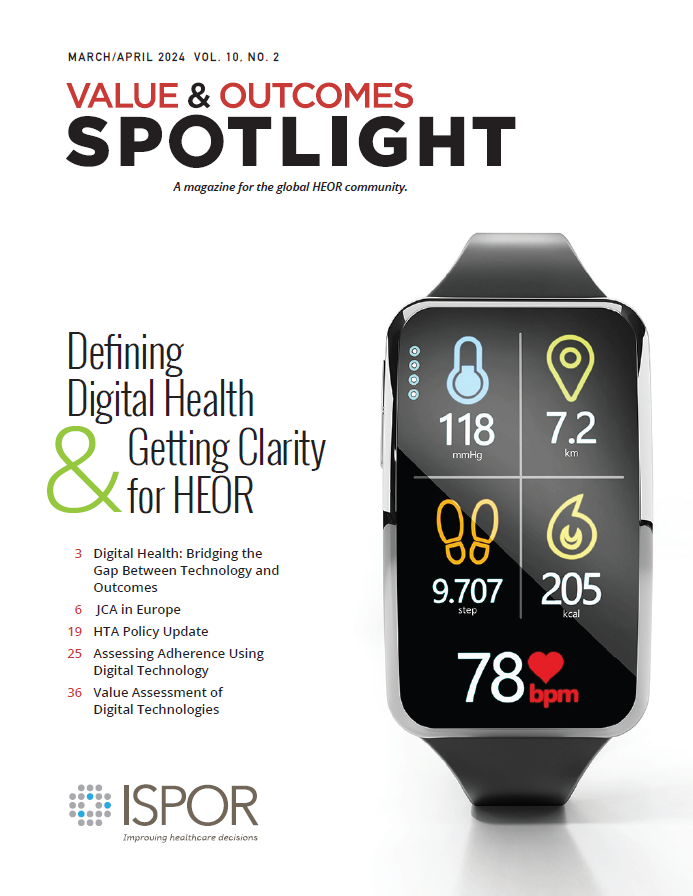Digital Health: Bridging the Gap Between Technology and Outcomes
Zeba M. Khan, RPh, PhD, Editor-in-Chief, Value & Outcomes Spotlight
 In an era where they permeate every
aspect of our lives, technology and digitalization have also revolutionized
healthcare. Digital health is the term coined for the convergence of digital
innovation and health services. But what exactly is digital health and how does
it affect health outcomes and healthcare policy?
In an era where they permeate every
aspect of our lives, technology and digitalization have also revolutionized
healthcare. Digital health is the term coined for the convergence of digital
innovation and health services. But what exactly is digital health and how does
it affect health outcomes and healthcare policy?
Digital health encompasses a broad
spectrum of technologies, applications, and services that leverage digital
tools to enhance health and wellness. From wearable fitness trackers to
telemedicine platforms, the digital health ecosystem is vast, dynamic, and
ever-expanding. As examples, digital health includes mobile health apps,
electronic health records (EHRs), remote monitoring devices, and artificial
intelligence-driven diagnostics—just to name a few.
The positive effects of digital health on patient outcomes are multifaceted. First and foremost, digital health has the potential to empower individuals to take charge of their own health. Mobile apps provide personalized health information, track physical activity, and offer reminders for medication adherence. Patients can access their EHRs, view test results, and communicate with healthcare providers seamlessly. This empowerment leads to better self-management and thus improved health outcomes.
"The positive effects of digital health on patient outcomes are multifaceted. Digital health has the potential to empower individuals to take charge of their own health."
As we have discussed in a previous
issue of Value & Outcomes Spotlight, wearable devices and health
sensors collect real-time data on vital signs, sleep patterns, and activity
levels and may allow for early detection and prevention of medical issues. By
analyzing this data, healthcare professionals can identify early warning signs
of diseases such as diabetes, hypertension, or sleep apnea. Timely
interventions can prevent complications and improve overall health.
Digital health also enables virtual
consultations, telemedicine, and remote consultations. Patients can consult
specialists from the comfort of their homes, reducing travel time and enhancing
access to healthcare. Telemedicine also facilitates follow-up care, reducing
readmission rates.
Advances in genomics and data
analytics allow for personalized treatment plans and medicines. Digital tools
analyze genetic information, predict drug responses, and tailor therapies based
on an individual’s unique profile. Precision medicine of this kind improves
treatment efficacy and minimizes adverse effects.
Health apps can encourage positive behaviors. Whether it’s quitting smoking, managing stress, or maintaining a healthy diet, digital interventions provide reminders and educational content that can lead to behavioral changes critical for preventing chronic diseases.
"Digital health is not a futuristic concept—it is reality today. As we navigate this digital frontier, policy makers, healthcare providers, and patients must collaborate to harness its potential."
The rise of digital health also
presents new challenges that healthcare policy must address. These include
ensuring data privacy and cybersecurity, as well as promoting equitable access
to digital health technologies. Healthcare policies need to be robust and
flexible, capable of protecting patients in a digital age while also fostering
innovation. Policy makers are tasked with the complex job of balancing these
needs. They must create regulations that safeguard patient information and
ensure the security of digital health platforms, while also promoting a fair
digital health environment where all individuals, regardless of their
socioeconomic status, can benefit from the advancements. The successful
integration of digital health into healthcare policy has the potential to
create a more responsive and effective healthcare system, ultimately leading to
improved health outcomes.
In conclusion, digital health is not a
futuristic concept—it is reality today. As we navigate this digital frontier,
policy makers, healthcare providers, and patients must collaborate to harness
its potential. By embracing digital health thoughtfully, we can improve health
outcomes, enhance patient experiences, and create a more resilient healthcare
system for all.
As always, I welcome input from our readers. Please feel free to email me at zeba.m.khan@hotmail.com.

